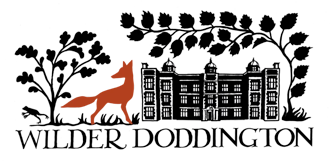A GREAT week at Wilder Doddington as two rare winter visitors, the Great Grey Shrike (Lanius excubitor) and Great White Egret (Ardea alba), are spotted along the footpaths of Wilder Doddington.
The Great Grey Shrike was seen searching for prey from the tops of our young trees. Also known as the butcherbird, the Great Grey Shrike has some unusual table manners. Preying on large insects and small mammals such as beetles, rodents, and sometimes even small birds, they will impale them on thorns or barbed wire to eat them or to store them for later.
The Great Grey Shrike travel from Norway for the winter, with a small number stopping in the UK over-winter. They are around the size of a blackbird, with a long tail, grey plumage, black eye mask and hooked beak. They are most likely to be seen on the tops of bushes and young trees, looking over scrubland. They are very territorial birds and usually only seen alone.
We have also had the pleasure of seeing a pair of Great White Egrets stalking through the scrubby wet grasses of Wilder Doddington this month. These amber listed birds are heron shaped and sized, a beautiful pure white with yellow beak and black legs.
Whilst previously a rare winter visitor to the UK, Great White Egrets have become more common nationally with a few pairs even breeding in the UK. They are a new visitor to Wilder Doddington. These elegant birds dine on fish, insects and frogs, making our seasonably wet, scrubby grassland and full ponds an ideal hunting ground for the pair.
When walking the footpaths and bridleways of Wilder Doddington keep your eyes on the tops of bushes and small trees for the Great Grey Shrike, and in the long, wet grasses for the Great White Egret.
If you see them, do let us know by emailing info@doddingtonhall.com
Remember to always stick to the public rights of way and do not stray into the fields. For these rare visitors and all other wildlife, it is important that our fields and woodlands stay undisturbed.






